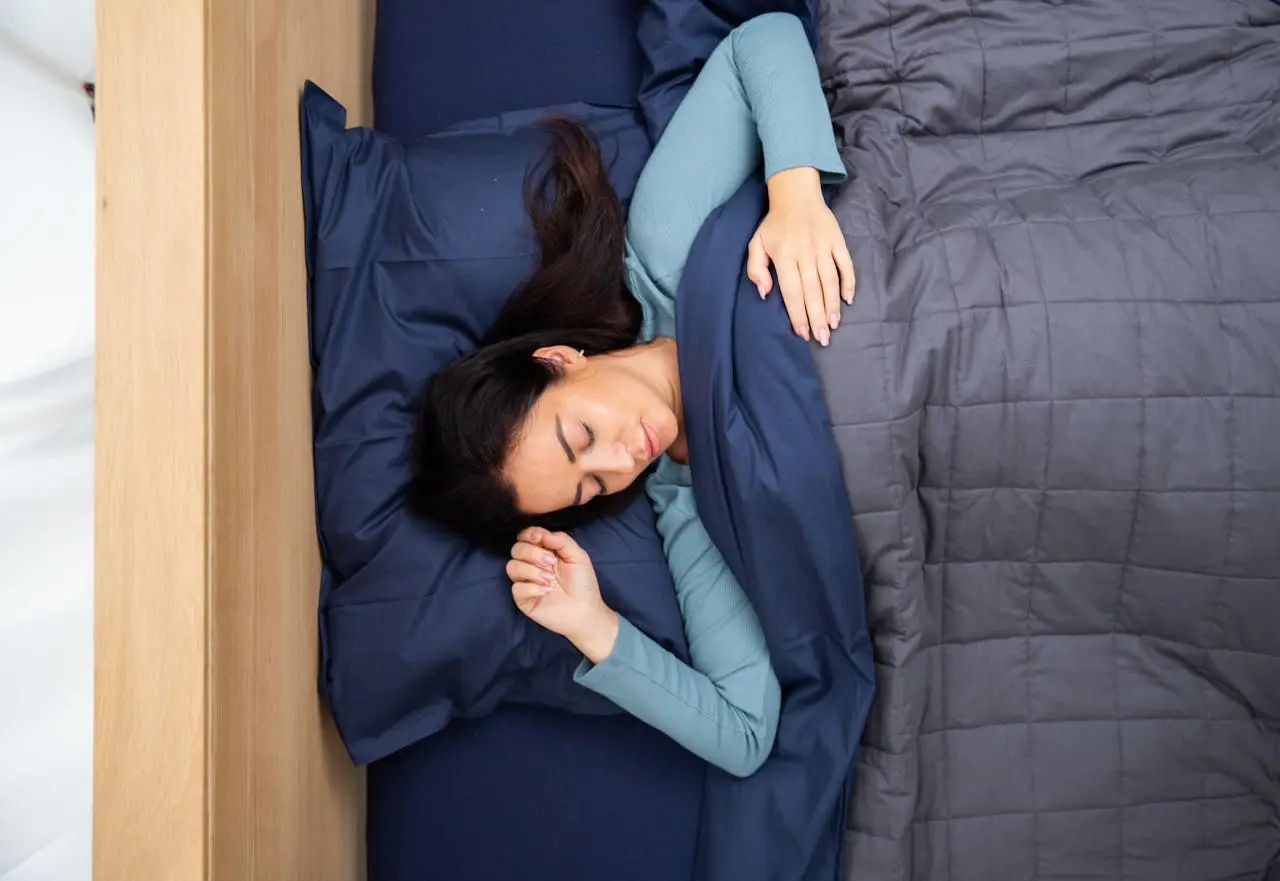Maybe you’ve seen your favorite influencer using a weighted blanket in their daily routine. Or perhaps ads have been popping up at you constantly. So, what the heck are weighted blankets anyway?
Weighted blankets have emerged from specialized therapy settings into mainstream wellness culture.
These heavy blankets, filled with glass beads or plastic pellets, have become increasingly popular among people seeking natural ways to manage anxiety and improve sleep quality.
But what exactly are they?
And can they really help with anxiety?
In this article, we take a closer look—including the science behind it all and precautions you should know.
What are Weighted Blankets?
A weighted blanket is exactly what it sounds like—a blanket with extra weight built into it.
Unlike traditional blankets made solely of fabric, weighted blankets contain evenly distributed pockets filled with materials like glass beads, plastic pellets, or even steel shot beads.
These blankets typically weigh between five and 30 pounds, making them significantly heavier than conventional blankets.
And surprisingly, this concept isn’t new.
Occupational therapists have been using weighted tools for decades to help children with sensory processing disorders and autism. However, their benefits for anxiety and sleep have sparked widespread interest, leading to their current popularity in the general consumer market.
Related Article: Reduce Anxiety: 4 Calming Techniques to Help Rewire Your Brain
The Science Behind the Comfort: Deep Pressure Stimulation
The magic behind weighted blankets lies in something called Deep Pressure Stimulation (DPS) or Deep Pressure Therapy.
This therapeutic technique involves applying gentle, distributed pressure across the body—similar to the sensation of a firm hug, a massage, or being swaddled.
When our bodies experience this gentle, distributed pressure, several physiological changes occur.
For one, DPS triggers the release of serotonin and melatonin—hormones associated with relaxation and sleep—while reducing cortisol, our primary stress hormone. This hormonal shift helps explain why many people find weighted blankets so calming.
The pressure also activates the parasympathetic nervous system, often called our “rest and digest” mode. This counteracts the sympathetic nervous system’s “fight or flight” response, which is often overactive in people with anxiety.
In fact, many studies indicate that DPS shows a promising avenue for managing and treating anxiety.
Benefits for Anxiety Sufferers
Research suggests these blankets can offer several benefits for people dealing with anxiety, including:
- Reduced physical symptoms: Users often report decreased heart rate and slower, deeper breathing when using weighted blankets. These physical changes can help break the cycle of anxiety, where physical tension feeds mental stress and vice versa.
- Better sleep: Many anxiety sufferers struggle with sleep, creating a frustrating cycle where lack of sleep worsens anxiety. Weighted blankets can help users fall asleep faster and experience fewer nighttime awakenings.
- Grounding effect: The pressure helps create a sense of being anchored or grounded in the present moment, which can be particularly helpful during anxiety attacks or periods of heightened stress.
- Natural coping tool: Unlike medication, weighted blankets offer a non-pharmaceutical approach to managing anxiety symptoms. They can be used alongside other treatments or as a standalone coping strategy.
Related Article: 10 Social Anxiety Hacks to Help You Start a Conversation
Choosing the Right Weighted Blanket
Disclosure: As an Amazon Associate, we earn a commission when you click the link and finalize a purchase (At zero cost to you.). We participate in programs like these to keep providing our readers free daily motivational content.
Selecting the right weighted blanket is important for safety and effectiveness.
The general guideline is to choose a blanket that’s approximately 10% of your body weight.
For example, a 150-pound person would typically do well with a 15-pound blanket. Some experts suggest going slightly heavier or lighter based on personal preference, but staying within 8-12% of your body weight is recommended.
The blanket should cover your body but not hang too far over the sides of your bed.
This ensures the weight stays on your body rather than pulling the blanket to the floor.
Lastly, consider both the outer fabric and the weighted fill material.
Cotton is breathable and good for year-round use. Minky or fleece options provide extra warmth, and glass beads are often preferred over plastic pellets as they’re more environmentally friendly and create a thinner blanket. Choose according to your personal preference!
Some weighted blankets we like:
Important Safety Considerations and Limitations
While weighted blankets are generally safe, they’re not suitable for everyone. People with certain health conditions should consult their healthcare provider before using a weighted blanket.
This includes individuals with:
- Respiratory problems like asthma or sleep apnea
- Circulatory issues
- Claustrophobia
- Low blood pressure
- Type 2 diabetes with circulation issues
These blankets also aren’t recommended for children under two years old, and children should always use blankets specifically designed for their age and weight.
It may also be worthwhile to note that the extra weight can trap heat, which might be uncomfortable for people who tend to sleep hot. Look for blankets made with cooling fabrics if this is a concern.
The Bottom Line
These blankets aren’t a miracle cure for anxiety, but they can be a valuable tool in managing anxiety symptoms.
The science behind Deep Pressure Stimulation (DPS) offers a logical explanation for why many people find them helpful.
While research is still ongoing, existing studies and widespread anecdotal evidence suggest they can be an effective, non-pharmaceutical option for anxiety relief.
Keep in mind, however, that what works for one person may not work for another.
If you’re considering a weighted blanket for anxiety, ensure you choose the right weight and consult with healthcare providers if you have any underlying health conditions.
When used appropriately, these blankets can provide a safe, natural way to find calm in moments of anxiety and potentially improve overall sleep quality—much like a warm hug from a loved one can melt away stress and enhance our mood!
Read Next: Using the 333 Rule and the 54321 Method for Moments of Anxiety

